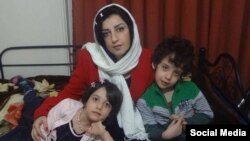In Iran, a country with the highest number of executions per capita of any in the world –- many after trials that do not meet international standards of fairness –- it is dangerous to support the abolition of the death penalty.
Witness the case of Narges Mohammadi – lawyer, journalist, human rights defender, and mother of two young children. An appeals court in Iran has upheld the 16-year sentence Ms. Mohammadi received in May 2016 for supposedly establishing an “illegal group” opposed to the death penalty and for other national security crimes.
Ms. Mohammadi is a former spokesperson for Nobel Peace laureate Shirin Ebadi’s now banned Center for Human Rights Defenders, and she has also been an advocate for women’s rights, religious and ethnic minorities, and political prisoners. She has been repeatedly incarcerated because of her human rights work and is currently imprisoned in Evin. She has a history of seizures and loss of vision, and has been denied adequate medical care in prison.
Amnesty International called the verdict by Iran’s appeals court “another cruel and devastating blow to human rights in Iran.” Human Rights Watch said it was “the latest example of the judiciary crushing dissent.” The International Campaign for Human Rights in Iran declared that upholding the 16-year sentence constituted “a blatant violation of Iran’s own laws, as well as its international commitments guaranteeing the rights of citizens to freely express their views and work for peaceful causes within the law.”
U.S. officials have repeatedly spoken out about the injustice of Iran’s treatment of Narges Mohammadi. After the verdict by the appeals court was reported, State Department Deputy Spokesperson Mark Toner said the United States was “deeply troubled”:
“No one should be jailed for peaceful civic activism. We are further concerned about reports that Mohammadi’s health is rapidly deteriorating while in prison, and that she’s been cut off from communicating with her two young children.”
“The imposition of this prison sentence is particularly harsh and unjustified,” added Mr. Toner, “and we call on the Government of Iran to provide Mohammadi with adequate medical care and to release her on humanitarian grounds.”














